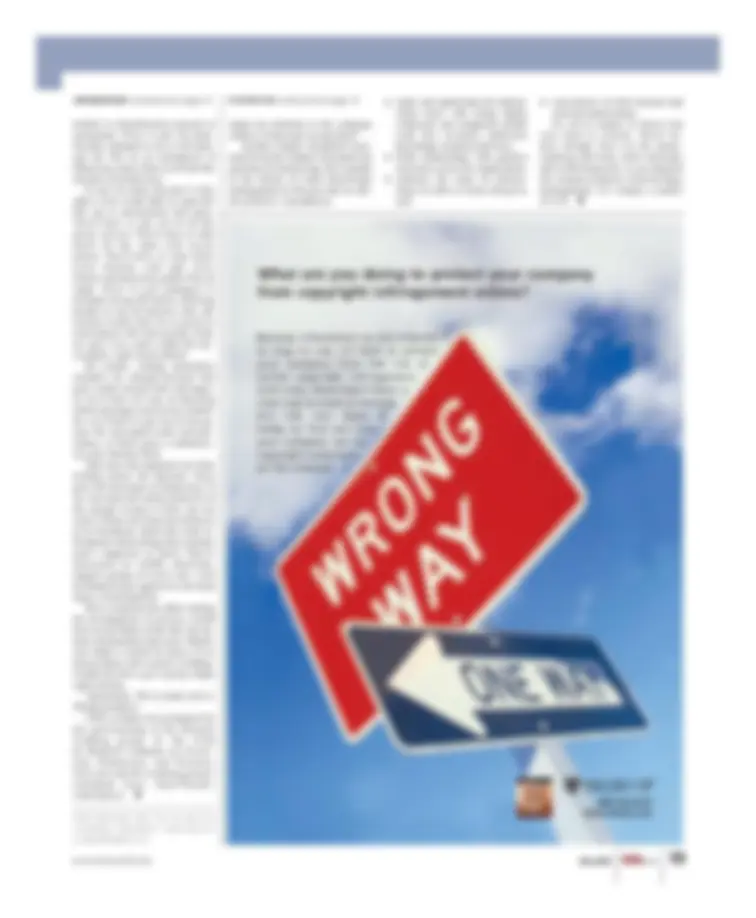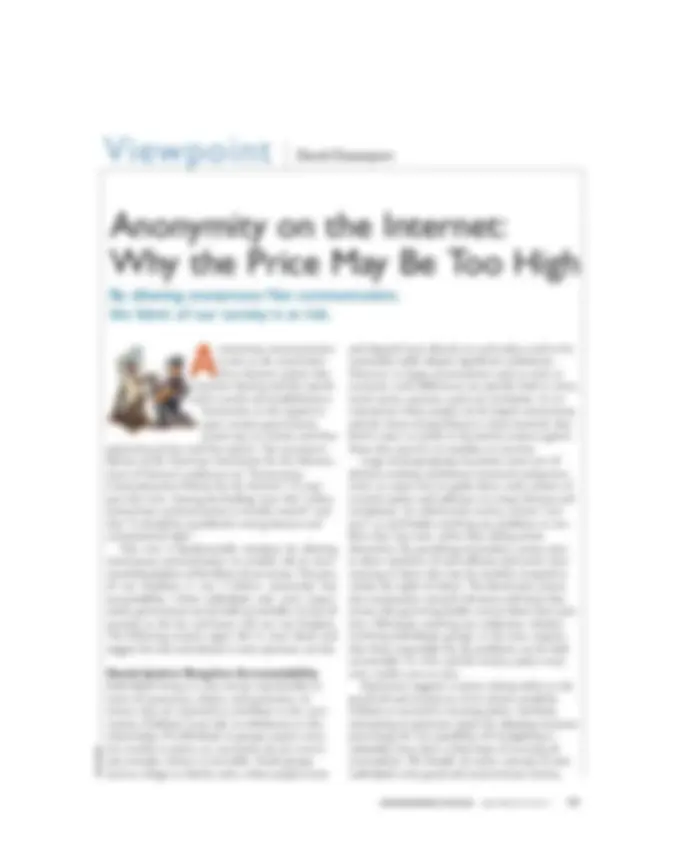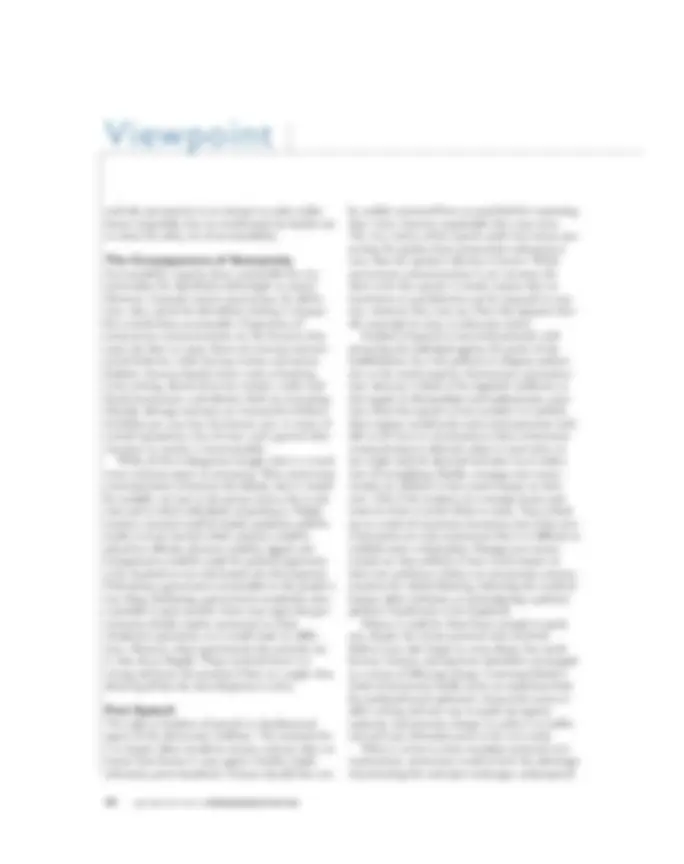





Study with the several resources on Docsity

Earn points by helping other students or get them with a premium plan


Prepare for your exams
Study with the several resources on Docsity

Earn points to download
Earn points by helping other students or get them with a premium plan
Community
Ask the community for help and clear up your study doubts
Discover the best universities in your country according to Docsity users
Free resources
Download our free guides on studying techniques, anxiety management strategies, and thesis advice from Docsity tutors
Two opposing views on the issue of online anonymity. One argument advocates for the importance of anonymity in promoting free speech and protecting privacy, while the other argues that the lack of accountability associated with anonymous communication can lead to criminal and antisocial behavior, and ultimately threaten the fabric of society. The document also discusses the implications of anonymous communication for free speech and social justice.
Typology: Papers
1 / 6

This page cannot be seen from the preview
Don't miss anything!




Paper Assignment #2: Opinion Paper (100 points) Due: Thursday, February 23, 2006
Your second paper assignment is a debate piece addressing the issue of anonymity online. You will draw reference points for discussion from the two attached papers (one for and one against online anonymity). You will take a position of your own in your paper and develop your own lines of argument over this issue.
Here are the main points to consider while working on this paper:
The paper should be approximately four double-spaced pages (excluding references) using a 12-point with one-inch margins on all sides. It must be typed and turned in at the start of class on Thursday, February 23, 2006. No late papers will be accepted.
For further questions about this assignment, email Professor Tai at ztai@siue.edu.
1
COMMUNICATIONS OF THE ACM April 2002/Vol. 45, No. 4 33
nonymous communication is seen as the cornerstone of an Internet culture that promotes sharing and free speech and is overtly anti-establishment. Anonymity, so the argument goes, ensures governments cannot spy on citizens and thus guarantees privacy and free speech. The recommen- dations of the American Association for the Advance- ment of Science’s conference on “Anonymous Communication Policies for the Internet” [1] sup- port this view. Among the findings were that “online anonymous communication is morally neutral” and that “it should be considered a strong human and constitutional right.” This view is fundamentally mistaken; by allowing anonymous communication we actually risk an incre- mental breakdown of the fabric of our society. The price of our freedoms is not, I believe, anonymity, but accountability. Unless individuals and, more impor- tantly, governments can be held accountable, we lose all recourse to the law and hence risk our very freedom. The following sections argue this in more detail and suggest the only real solution is more openness, not less.
Social Justice Requires Accountability Individuals living in a free society reap benefits in terms of sustenance, shelter, and protection. In return, they are expected to contribute to the com- munity. Problems occur due to imbalances in this relationship. If individuals or groups acquire exces- sive wealth or power, or, conversely, do not receive just rewards, tension is inevitable. Small groups, such as villages or family units, where people know
and depend more directly on each other, tend to be reasonably stable despite significant imbalances. However, in larger communities, such as cities or countries, such differences can quickly lead to crime, social unrest, protests, and even revolution. In cir- cumstances where people can be largely anonymous, and the threat of punishment is thus minimal, they find it easier to justify to themselves actions against those they perceive as outsiders or enemies. Large social groupings necessitate some sort of decision-making mechanism (monarch and govern- ment, to name two) to guide them, and a system of controls (police and judiciary) to ensure fairness and compliance. In a democratic society, citizens “con- sent” to such bodies resolving any problems or con- flicts that may arise, rather than taking action themselves. By punishing misconduct, society aims to deter repetition of such offenses and send a clear warning to those who may be similarly tempted to violate the rights of others. The democratic system also incorporates controls (elections and laws) that ensure that governing bodies cannot abuse their posi- tion. Obviously, resolving any unfairness, whether involving individuals, groups, or the state, requires that those responsible for the problems can be held accountable. In a free and fair society, justice must exist, and be seen to exist. Experience suggests a society relying solely on the good will and conscience of its citizens would be unlikely to succeed in ensuring justice. Similarly, attempting to guarantee justice by adopting measures preventing the very possibility of wrongdoing is unfeasible since there is little hope of covering all eventualities. We should, of course, attempt to raise individuals to be good and conscientious citizens,
LISA HANEY
By allowing anonymous Net communication, the fabric of our society is at risk.
34 April 2002/Vol. 45, No. 4 COMMUNICATIONS OF THE ACM
and take precautions in an attempt to make misbe- havior impossible, but we would surely be foolish not to retain the safety net of accountability.
The Consequences of Anonymity Accountability requires those responsible for any misconduct be identified and brought to justice. However, if people remain anonymous, by defini- tion, they cannot be identified, making it impossi- ble to hold them accountable. Proponents of anonymous communications on the Internet thus open the door to many forms of criminal and anti- social behavior, while leaving victims and society helpless. Internet-based crimes, such as hacking, virus writing, denial-of-service attacks, credit card fraud, harassment, and identity theft are increasing. Already, damage estimates are measured in billions of dollars per year, but the human cost, in terms of ruined reputations, loss of trust, and a general dete- rioration in morals, is immeasurable. While all this is dangerous enough, there is a much more ominous aspect to anonymity. Were anonymous communication to become the default, then it would be available, not just to the private citizen, but to the state and to those individuals comprising it. Highly sensitive material could be leaked, paybacks could be made to secure lucrative deals, pressure could be placed on officials, elections could be rigged, and arrangements could be made for political opponents to be attacked or even eliminated, all with impunity. Distrusting a government accountable to the people is one thing, facilitating a government completely unac- countable is quite another. Some may argue that gov- ernments already employ anonymity to cloak clandestine operations, so it would make no differ- ence. However, where governments do currently use it, they do so illegally. Those involved know it is wrong and know the penalties if they are caught, thus deterring all but the most desperate or naive.
Free Speech The right to freedom of speech is a fundamental aspect of the democratic tradition. The rationale for it is simple: Ideas transform society, and any idea, no matter how bizarre it may appear initially, might ultimately prove beneficial. Citizens should thus not
be unduly restricted from or punished for expressing their views, however unpalatable they may seem. The very notion of free speech under law means pro- tecting the speaker from prosecution and persecu- tion, thus the speaker’s identity is known. While anonymous communication is not necessary for there to be free speech, it clearly ensures that no restrictions or punishments can be imposed on any- one, whatever they may say. Does this apparent ben- efit outweigh its costs, as advocates claim? Freedom of speech is concerned primarily with protecting the individual against the power of the establishment, be it the political or religious authori- ties, or the moral majority. Anonymous communica- tion, however, is likely to be singularly ineffective in this regard. In dictatorships and undemocratic coun- tries where free speech is most needed, it is unlikely these regimes would make such communication avail- able at all. Even in circumstances where anonymous communication is allowed, unless it is pervasive, its use might easily be detected and taken as an indica- tion of wrongdoing. Besides, messages sent anony- mously are unlikely to have much impact on their own. Only if the recipient of a message knows and trusts its writer is action likely to ensue. Trust is built up as a result of numerous encounters, but if the com- munications are truly anonymous then it is difficult to establish such a relationship. Messages sent anony- mously are thus unlikely to have much impact on their own and hence reliance on anonymous commu- nications for whistle-blowing, informing the world of human rights violations, or promulgating a political platform would seem to be misplaced. History is made by those brave enough to speak out, despite the serious personal risks involved. Reform may take longer to come about, but surely bravery, honesty, and openness should be encouraged as a means of effecting change. Cowering behind a cloak of anonymity hardly seems an auspicious basis for profound social upheavals. Anonymity seems to offer a cheap and easy way to speak out against authority and promote change; in reality it is ineffec- tual and may ultimately prove to be very costly. When it comes to more mundane personal com- munications, anonymity is said to have the advantage of promoting free and open exchanges, unhampered
Viewpoint